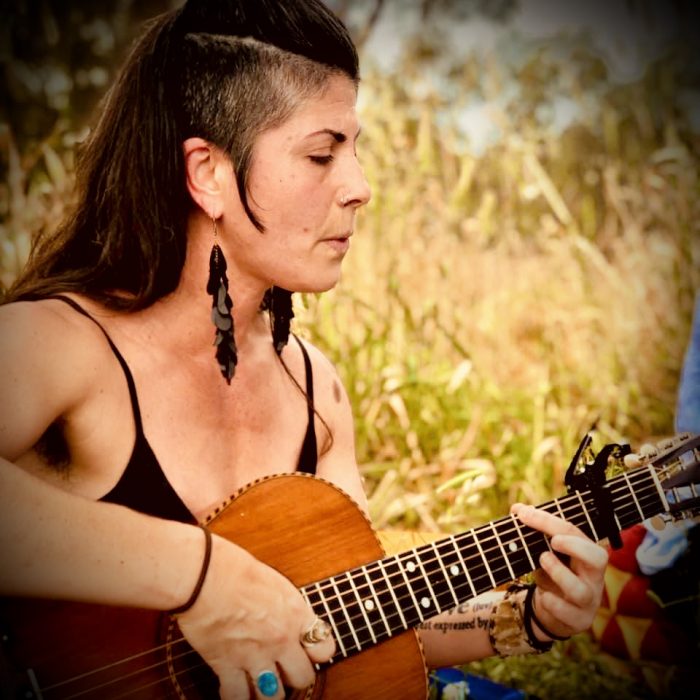When you’re a good guitarist, you can make a bad guitar sound great. When you’re a sh*t guitarist, you need a good guitar.
So said my friend when I told him I’d like to upgrade to a better instrument, but that I wasn’t sure I deserved one. I was at the very early stages of learning guitar. I’d been playing maybe 6 months on a guitar that the music shop guy told me was ‘practically a toy’.
I hadn’t been prepared to spend much on my first guitar, unsure as to whether I’d stick at it or whether it would become yet another hobby ditched for some other shiny thing in a month.
Once I’d been diligently practising for several months, I began to crave an instrument that I could really connect with. After a couple of weeks of solid, daily 6-hour sessions, I knew I was hooked. That’s when I started dreaming of a real guitar.
My friend’s advice was excellent, as it turned out.
I bought myself a beautiful little Hawaiian parlour guitar that’s about 100 years old. Her sound is sweet and bright. I love her so much. I play her all the time and I’m inspired to get better so I can honour her.
Yet, the question of whether I deserved a good guitar rang in my head long after I asked it.
What part of me felt so small and unworthy that I might not deserve to have a lovely musical instrument that sounds good? Why would I deny myself this pleasure?
I’ve been sitting with this puzzle, and I got the answer last week when I visited another old friend.
We got talking about finances – investing, shares, cryptocurrency. It turns out this friend has done quite well for himself financially. He especially loves crypto and pours over the subject for many hours each day. He’s a bit of a gun.
Now, me… I’m interested in cryptocurrency. I have a bit -but just the teeniest bit. As a single parent for almost all of my adult life, I used to find it challenging to have even a bit. Recently, though, I’ve been working on catching up.
So my bit of crypto caught my friend’s interest.
“Come around one day next week and I’ll look over your portfolio if you like,” he suggested.
It was a generous offer, and such a wonderful opportunity to have someone with a strong knowledge base look over my investment. Lucky me.
“Sure,” I said, “I’ll let you know.”
I felt my body contract as I said it. I had no intention of ever allowing him to look at my portfolio. If he asked again, I’d tell him I already did it and that I’m happy with my choices, thank you very much.
No way I wanted to let my friend see how meagre my investment is.
No way was I up for his judgement.
No way did I want anyone to see that I’d struggled.
No way did I feel I could put my pride aside and allow someone who has been my beloved friend for more than 15 years to see my soft, vulnerable parts. No way did I feel courageous enough to let him in and ask for his help, even though I sometimes struggle with the thought that I am so far behind. Even though I could really use his help.
Pride is a funny thing.
It can keep us isolated.
When we puff our chests out and say “I’m fine,” when we are not, people turn away. Our discomfort activates their discomfort. They feel awkward and they sense they’d best not push the matter. They don’t want to hurt our feelings. They stop offering their help.
When we use pride to hide our shame, we are denying ourselves connection, opportunity, help, care, peace, love. When we do this enough times, we teach ourselves that this is the only way. We teach others not to come too close. This pattern becomes the way we live.
We deny ourselves the beautiful guitar that our hearts would love to hold, that our hands would love to play. The guitar that would sound so lovely and inspire us to greater heights.
I called my friend this week. I sat in the discomfort of that call and I breathed.
I asked him for dinner and I asked him for help.
I did not crumble. I did not die. I did not implode in fiery flames, knowing he is going to see the smallness of what money I have managed to save, compared to the bigness of what some others’ have.
Before I see him, I’m practising to lean into the discomfort of allowing my vulnerable parts to be seen. I am remembering that my old pattern of “I’m fine” hasn’t got me a big, fat crypto portfolio – or anything else, actually. I am gently reminding myself every time I think about our upcoming meeting that I am safe. I’m playing my guitar and thinking of the time when I thought I wasn’t good enough to have her.
It’s ok to ask for help. It’s ok not to be an expert.
When you have a teeny crypto portfolio, you need to swallow your pride and ask your wealthy and knowledgeable friends to help you.
And when you’re an average guitarist, you need a good guitar.












Read 0 comments and reply